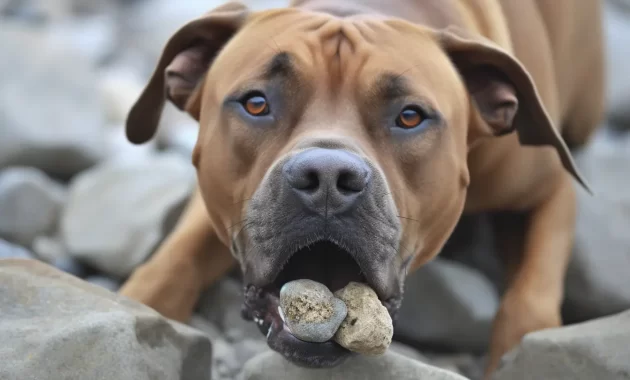
Have you ever found your pup munching away on an unsuspecting rock? It may have been a startling sight, but it’s not uncommon to see our canine friends engaging in this strange behaviour.
As pet parents, it’s must understand why our dogs eat rocks and how we can help them stop.
From medical conditions to boredom and deprivation, let’s explore the reasons behind this strange behaviour.
We often think of our beloved pets as family members – for good reason! We love our furry friends with all our hearts, so we want to keep them safe and healthy.
While eating rocks might seem like a harmless curiosity, it can easily lead to dangerous consequences.
Let’s exaLet’sine why your dog eats rocks and what you can do about it.
Table of Contents
- Medical Conditions
- Boredom Or Deprivation
- Coprophagia
- Stress Or Anxiety
- Dietary Deficiencies
- Frequently Asked Questions
- Conclusion
Medical Conditions
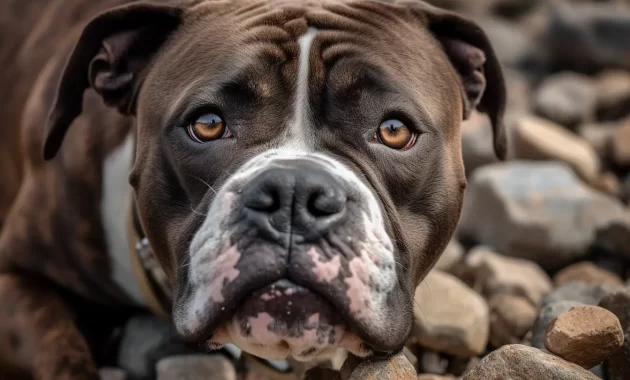
Seeing your beloved canine companion chomping down on a rock can be startling and alarming.
But why does your pup engage in such peculiar behaviour? We must consider the potential medical conditions causing this strange habit to answer that question.
Gastrointestinal issues are one possible explanation for your pup’s penchant for munching on rocks.
If your dog suffers from an upset stomach or a digestive disorder, they may attempt to self-medicate by consuming anything they can get their paws on.
Additionally, gastrointestinal issues can lead to malnutrition and mineral deficiencies, which might cause your pup to seek out sources of minerals like rocks.
Sensory problems could also be at play here. In some cases, dogs may find the texture of rocks soothing or enjoyable — similar to when humans chew gum or bite their nails.
Also, suppose there is an underlying neurological condition present in your pup.
In that case, it could be causing them to experience sensory sensations that drive them to eat something as unusual as rocks.
It is essential to take note of any behavioural changes in your pup and discuss them with a veterinarian if needed.
With the help of proper diagnosis and treatment options, you can work with your vet to keep your dog healthy and happy!
SEE ALSO
Dog Breeds Beginning With M
What Dog Breeds Beginning With The Letter K?
Boredom Or Deprivation
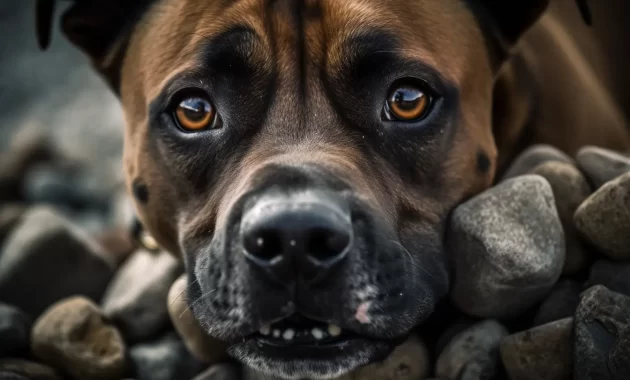
While medical conditions can cause dogs to eat rocks, it is more likely that boredom or deprivation are the culprits.
Sometimes, dogs may be so strong that they eat anything they can get their mouth on.
This behaviour is often accentuated in an environment lacking stimulation and insufficient food or treats.
Another possible reason behind rock eating is mineral craving.
Dogs need certain minerals to maintain their health, and if they lack them in their diet, they may start looking for alternative sources such as rocks and dirt.
It must be paying close attention to the type of diet you provide your dog, as this could help them avoid seeking out other sources of minerals.
It is also important to remember that even if your dog eats rocks, it doesn’t mean something is wrong.
Eating rocks could signify boredom or a way for your pup to satisfy its foraging instinct.
Once you address these issues, the issue w resolve itself naturally.
Coprophagia
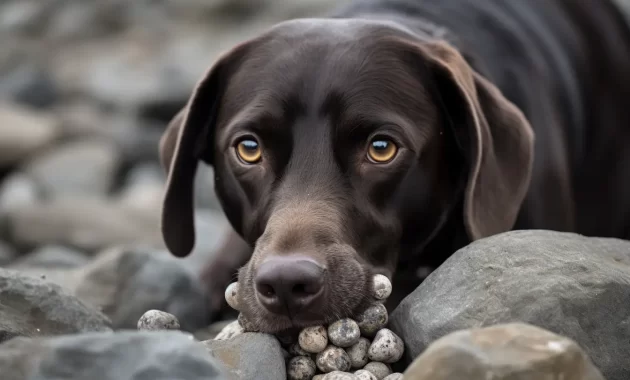
Surprisingly, coprophagia, or eating feces by dogs, is pretty standard.
According to a survey conducted in 2017 by the National Veterinary Survey, an estimated 10% of pet owners have reported this behaviour in their dogs.
Various factors can cause this instinctual behaviour, and it is often not considered harmful if it is occasional.
Coprophagia is thought to be an instinctual behaviour that some dogs may display due to environmental factors such as stress, lack of exercise, or boredom.
It may also occur when puppies are weaning from their mother’s milk and eating their mother’s nutritional purposes.
Other causes include medical issues such as digestive disorders or dietary deficiencies.
It should be noted that coprophagia can be dangerous for dogs if parasites are present in the fecal matter they eat.
If a dog displays this behaviour regularly, owners should consult their veterinarian for advice on preventing it and ensuring their pet is healthy.
Stress Or Anxiety
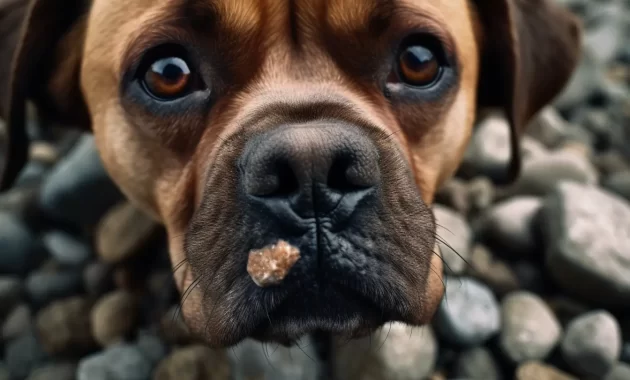
Coprophagia, or stool eating, can indicate underlying physical or mental health issues in your dog.
It can also be caused by environmental changes or social isolation. Stress and anxiety are common culprits, as these feelings can lead to various behaviours, including coprophagia.
A change in environment is often a source of stress for dogs. Introducing a new pet, moving to a new home, or rearranging furniture can all cause anxiety.
Social isolation is another factor that should be considered when investigating the causes of coprophagia. Dogs are social creatures and need interaction with their owners and other animals to stay healthy and happy.
They may develop compulsive behaviours such as eating rocks if they feel neglected due to lack of attention or time spent together.
Identifying the source of your dog’s behaviour is to find the best solution.
A visit to the vet will help rule out any medical causes for the behaviour.
If no medical condition is found, environmental or social changes may be necessary to reduce your pet’s stress and anxiety levels.
With some patience and understanding from you as their owner, you can help them work through any issues causing their unusual behaviour.
Dietary Deficiencies
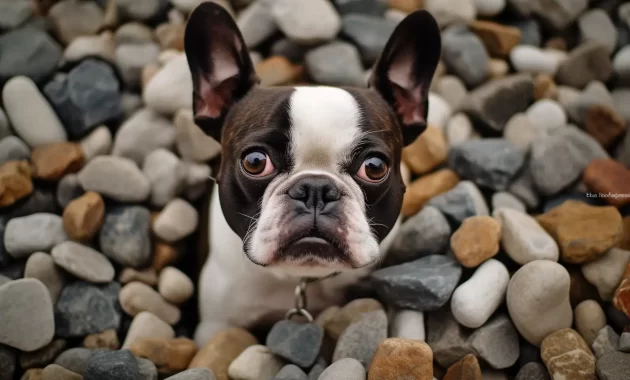
Dietary deficiencies may explain why some dogs eat rocks.
Dogs with mineral deficiencies may be drawn to the minerals found in rocks and soil, including calcium and phosphorus.
Ingesting these substances provides a compensatory benefit for the body’s need for mineral bodies in their diet.
In addition to mineral deficiencies, dietary imbalances can also cause dogs to seek out other sources of nutrition, such as rocks. If a dog lacks specific vitamins or proteins in their daily food intake, they may try to find alternative sources of sustenance.
Although eating rocks is not ideal, your dog may be trying to make up for what their diet lacks.
To address this issue, paying close attention to your pet’s diet and ensuring it comprises all the essential nutrients they need is important.
Consulting with a veterinarian will help you determine if your dog has any dietary deficiencies or imbalances that need to be addressed and advise you on how best to meet your pet’s nutritional needs.
With the proper care and attention, you can give your pup the nourishment they need without them having to resort to eating rocks.
Frequently Asked Questions
How Much Rock Is Too Much For My Dog To Ingest?
It is important to note that a dog’s tendency to eat dogs can indicate underlying health or behavioural issues.
Understanding how much rock is too much for your pup to ingest can help you determine if intervention is needed.
Experts suggest that the size of rocks should not exceed the size of your dog’s mouth.
If your dog’s trying to swallow larger stones, this could be a sign that further evaluation is necessary to determine why they are engaging in this behaviour.
Additionally, if you notice any changes in appetite, weight loss, or vomiting after your dog ingests a rock, contact your veterinarian immediately.
Is There A Way To Prevent My Dog From Eating Rocks?
Preventing your dog from ingesting rocks can be done by exercising caution, taking vet advice, and being watchful and monitoring their environment.
A nutrition review may also help ensure your pup gets all the necessary nutrients. Environmental enrichment can give them more attractive, appropriate items to focus on instead of rocks.
By implementing these measures, you can keep yourself from eating rocks and help them stay healthy!
What Types Of Rocks Are Most Commonly Eaten By Dogs?
Regarding rock types, certain textures and shapes are more attractive to dogs than others.
Generally speaking, smooth rocks with round or oval shapes are the most popular among canines. Stones with beautiful colours, such as bright reds and oranges, will entice your pup.
Smaller rocks are more accessible for a dog to swallow than large ones, so that some breeds may prefer smaller stones.
Fortunately, there are ways you can discourage your pup from consuming rocks altogether – including making sure they have plenty of healthy chew toys and treats available.
How Do I Know If My Dog Has Ingested Too Many Rocks?
If you’re concerned that you may have ingested too many rocks, paying attention to their size and chewing habits is essential.
Rocks more significant than a penny can be more hazardous for your dog and should be avoided as much as possible.
If your dog constantly snacks on rocks, speaking with your vet about potential health risks is a good idea.
Your vet might suggest giving them a special diet or may even recommend teaching them some new behaviours so they can avoid the temptation of rocks in the future.
Are There Any Potential Health Risks Associated With A Dog Eating Rocks?
Rock digestion and nutrition can be significant health concerns regarding dogs eating rocks.
Ingesting rocks can lead to several potential risks, such as a choking or intestinal blockage.
Some rocks contain minerals that can throw off a dog’s electrolyte balance when ingested.
If your pup has eaten too many rocks, it is essential to seek veterinary care immediately.
Conclusion
It’s essential to be aware of the potential risks associated with a dog eating rocks and to take steps to prevent them.
As a pet owner, you should monitor the amount of rock your pet is ingesting and take them to the vet if you suspect they’ve overeaten.
Keeping an eye on their pup’s diet and environment can help the dog say healthy, strong, and rock-free!
If you have further questions or concerns about why your dog might be eating rocks, don’t hesitate to contact your vet.




